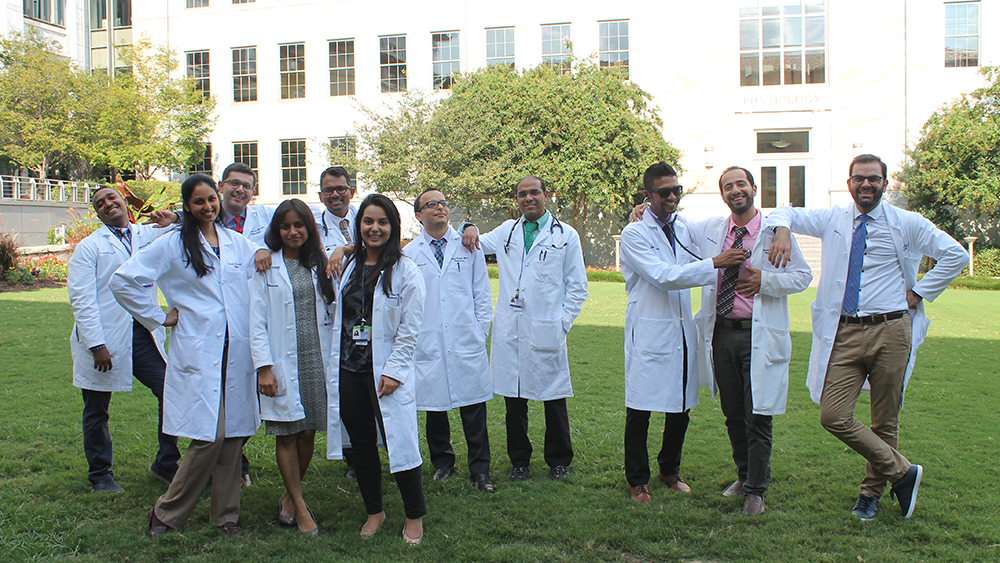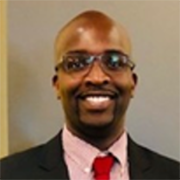The Nephrology Fellowship training program provides comprehensive training in clinical nephrology and research in areas related to normal physiology and diseases of the kidney. Our mission is to train outstanding clinical nephrologists and renal physician-scientists who will become the next generation of leaders in the field of nephrology.
Program Details
The Nephrology Fellowship Training Program at Emory offers:
- On average seven scholarly/ambulatory months over the two-year fellowship
- All expense paid national conference (ASN Kidney Week) attendance in your second year
- 100 percent job placement mostly anywhere of your choosing
- 98 percent board pass rates
- APPs on all consult services
- Internationally and nationally renowned teaching faculty
- Free ASN and NKF memberships
- Free access to electronic medical library
The Nephrology Fellowship Training program provides comprehensive training in clinical nephrology and research in areas related to normal physiology and diseases of the kidney. Our mission is to train outstanding clinical nephrologists and renal physician-scientists who will become the next generation of leaders in the field of nephrology.
The majority of the fellows in the program pursue a two-year clinical track. Selected fellows with outstanding research potential may be invited to join the research track, which consists of one year of clinical training and at least two years of laboratory or clinical research training.
Clinical and Research Overview
The Emory University School of Medicine offers a comprehensive training program in the study of Nephrology, which is designed to produce competent subspecialists and clinical investigators following a period of intensive training. Two tracks are offered:
Academic Track
For those interested in pursuing an academic career, a year of clinical training followed by two years of protective time in research in areas of interest selected by the trainees with their choice of
Clinical Track
For those interested in solely pursuing a clinical career, a year of clinical training is followed by a second year with time devoted to scholarly activity and clinical training. Most trainees are able to submit a completed project for publication. Trainees will also be required to participate in continuity care clinic, transplant clinic, in-center hemodialysis clinic, and home dialysis clinic.
Training Hospitals and Locations
The fellowship training takes place at four hospitals: Emory University Hospital, Emory University Hospital Midtown, Grady Memorial Hospital, and the Atlanta VA Medical Center. In addition, there are outpatient training opportunities at several of Emory’s dialysis centers.
Fellows are provided a unique patient population between the hospitals and Emory’s five Dialysis Centers where they will also have the opportunity to assess patients with a variety of diseases including Glomerulonephritis, PKD, HIV, transplant
Faculty
The Emory University Renal Division is known for its excellent clinical program and world-class basic and translational scientists that consists of more than forty faculty members who are passionately dedicated to patient care and research. Among them are fourteen former fellows of the Emory Nephrology Fellowship Training Program, one former APS President, two Carl W. Gottschalk Award Lecturers (prestigious award granted to groundbreaking researchers), and a Kidney Ebola specialist. More than sixteen of the divisions faculty are principal investigators on federal and non-federal grants, and more than half of our faculty are women. In addition, Emory has the only Renal Ultrasonography certification program in the world and prides itself on its international presence.
Our faculty members have numerous publications in various journals ranging from the Journal of American Society of Nephrology to the New England Journal of Medicine and American Physiological Society.
Training and Curriculum
Consult Service
The nephrology service provides nephrology consultations at four hospitals including Grady Memorial Hospital, Emory University Hospital (EUH), Emory University Midtown Hospital (EUHM), and the Atlanta VA Medical Center (VA). During the consult service at each of the hospitals, the fellows learn to manage a broad spectrum of kidney disorders in critically ill patients. They are provided ample opportunity to get hands-on experience at acute hemodialysis, continuous renal replacement therapies, hemodialysis catheter placement and kidney biopsies.
Outpatient Dialysis Service
The emphasis on the outpatient dialysis service rotation is on learning to evaluate and manage patients undergoing in-center hemodialysis including managing dialysis prescriptions, hematologic and bone mineral parameters, and handling infectious and vascular access complications. Fellows receive education in water treatment, dialysis machine operation, and are trained in cannulating hemodialysis accesses and performing peritoneal exchanges. Fellows also actively participate in quality improvement activities at the dialysis unit. This rotation occurs during the scholarly/ambulatory months.
Ultrasound Service (minimum 2 months)
This service includes formal, comprehensive training in renal sonography and is accredited by the American Society of Diagnostic and Interventional Nephrology. Emory has the only fellowship program with this training in the country. The fellow performs diagnostic studies of native kidneys and renal allografts. The fellow learns to screen end-stage kidneys for carcinoma, learns to perform ultrasound guide for percutaneous renal biopsies; learns visualization of veins for central venous catheterization and performs diagnostic studies of urinary bladders and measure of post-void bladder volume. Once completed, the fellow is deemed certified at the end of the fellowship to conduct renal ultrasounds and interpret data.
Transplant Service (Inpatient and Outpatient) – (minimum of 2)
Emory performs more than 250 kidney transplants per year. To date, Emory has performed over 2,700 adult and pediatric kidney transplants. During the Transplant service, the fellow learns the acute management of post-operative transplant patients, dosing of immunosuppressive medications and the diagnosis and management of acute and chronic rejection, opportunistic infections, and other complications. The fellow also performs percutaneous kidney biopsies of native and transplant kidneys, places central venous catheters for dialysis and learns to interpret renal pathology and renal-related radiological studies.
Continuity Clinic (entire program)
The fellow has a weekly one half-day ambulatory renal clinic where he follows his own patients throughout the two-year clinical program. The clinic is structured where the fellow would see patients between Grady Memorial Hospital and either The Emory Clinic or the VA Medical Center. The clinics are structured in such a way that the fellow sees a wide variety of patients including those with acute and chronic kidney diseases. Due to the chronicity of diseases, most patients will be seen in follow-up several times per year.
Transplant Clinic
The fellow has an ambulatory transplant clinic during the scholarly activity/ambulatory months.
Scholarly Activity/Ambulatory (approximately 7 months)
The fellow will be able to work on their research projects in preparation of presenting at one of the nephrology national conferences. The fellow will also be able to participate in an ambulatory elective of their choosing, i.e., transplant, vascular surgery etc. in addition to preparing to take the boards. During this rotation, continuity clinics are continued. Fellows participate in dialysis rounds during this time.
Procedures
Fellows will perform all required procedures under the guidance of the attending on service throughout the fellowship. The required procedures consist of:
-
Acute Vascular Catheter Placement
-
Permcath Removal
-
Transplant Kidney Biopsy
-
Native Kidney Biopsy
Conference Schedule
Fellows are required to attend weekly conferences as part of the training. Core Conferences are also taped and uploaded online for fellows to review later.
The Didactic and Core Curriculum lectures are for both first and second-year fellows are presented by a clinical faculty member. The curriculum is designed to cover important relevant clinical topics germane to the field of nephrology over a two-year period. In addition to clinical topics, Quality Improvement, Morbidity and mortality, and Palliative Care are covered. They are scheduled Monday, Thursday, and Friday from 12:30-1:30 p.m. via zoom.
Renal Grand Rounds is every Tuesday evening 5 - 6 p.m. This conference is for the entire division (fellows, physicians, researchers, nurses, etc.) and is presented by guests from both inside and outside the university.
Journal Club is lead by a fellow at each of the hospital locations under the supervision of a designated faculty member. The articles are selected in conjunction with and are usually relevant to the weekly didactic lecture given the previous day.
Pathology Conference is a monthly conference that is led by faculty members from both nephrology and pathology, where three selected cases are reviewed with input from other faculty members.



